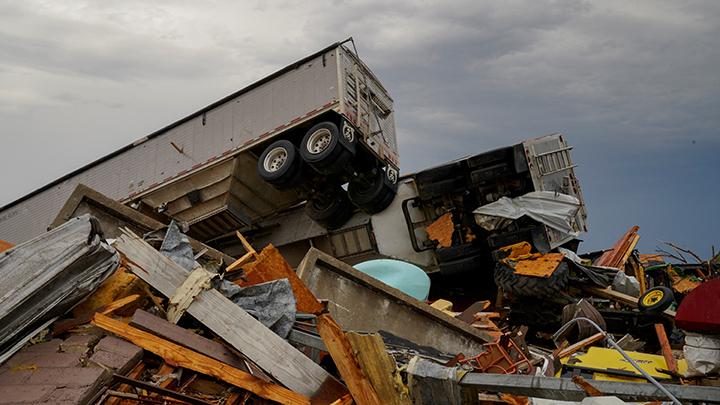TEMPO.CO, Jakarta - The new interim leader of Syria announced on Tuesday, December 10, 2024, that he would lead the country as an interim prime minister with the support of former rebels who ousted President Bashar al Assad three days ago, Reuters reported.
In a brief televised speech, Mohammed al-Bashir, a figure not widely known in most of Syria who previously ran a government in a small rebel-held northwest region, said he would lead the interim government until March 1.
"Today we held a cabinet meeting involving a team from the Security government working in Idlib and its surroundings, and the government of the ousted regime," he said.
"The meeting discussed the transfer of files and institutions to take over the government."
Behind him were two flags: green, black, and white flags flown by Assad opponents during the civil war, and a white flag with the Islamic creed oath in black script, usually flown in Syria by Sunni Islam fighters.
In the Syrian capital, banks reopened for the first time since Assad's ousting. Shops also reopened, traffic flowed smoothly again, construction workers returned to repair roundabouts in downtown Damascus, and street cleaners resumed sweeping the streets.
There was a noticeable decrease in the number of armed men on the streets. Two sources close to the rebels said their command had ordered fighters to withdraw from the cities and for police and internal security forces affiliated with the main rebel group, Hayat Tahrir al-Syam (HTS) to be deployed there.
Normalization Steps
Steps towards normalization are being taken despite intense Israeli airstrikes targeting Syrian military bases, whose troops have melted in the face of rebel lightning strikes that ousted Assad.
In a sign that foreign parties are ready to work with HTS, a former Al Qaeda affiliate leading the anti-Assad rebellion who has lately emphasized its separation from jihadist roots, the UN envoy for Syria played down the mention of HTS as a terrorist organization.
"The fact is so far HTS and other armed groups have sent good messages to the Syrian people... unity, inclusiveness," Geir Pedersen said at a press conference in Geneva.
The new interim Syrian leader does not have a prominent political profile outside of the Idlib province, a small region mostly rural in the northwest where rebels have maintained governance during long years when the front lines of the Syrian civil war were frozen.
A rebel government Facebook page said he was trained as an electrical engineer, later earned a degree in sharia law, and held various positions in various fields including education.
Israeli Strikes
Israeli strikes in the southwest and its air raids on the defeated army bases create additional security problems for the new government, although Israel insists its intervention is only temporary.
After Assad's escape on Sunday ended over five decades of his family's rule, Israeli forces moved into the buffer zone inside Syria established after the 1973 Middle East war.
Three security sources said on Tuesday that Israeli forces had moved forward from the demilitarized zone. One Syrian source said they had reached the town of Qatana, a few kilometers east of the buffer zone and a short drive from Damascus airport.
Israeli military spokesman Lieutenant Colonel Nadav Shoshani said his forces are still in the buffer zone and "several additional points" around it, with no significant push into Syria beyond the separation area.
"We are not involved in what is happening inside Syria, we are not involved parties in this conflict and we have no interest other than protecting our borders and our citizens' security," Shoshani said.
Regional security sources and officers within the Syrian military no longer in active service described the Israeli air strikes on Tuesday morning as the heaviest, hitting military installations and airbases across Syria and destroying dozens of helicopters and jets.
Turkey, Egypt, Qatar, and Saudi Arabia have condemned the Israeli attacks.
Celebratory Ice Cream
Rebuilding Syria will be a daunting task after 13 years of civil war that killed hundreds of thousands. Cities have been bombed to rubble, rural patches left abandoned, the country's economy shattered by international sanctions, and millions of refugees still live in camps after one of the largest displacements in modern times.
However, the atmosphere in Damascus remains festive, with refugees starting to return to the long-unseen homeland. Anas Idrees, 42, a refugee since the early days of the war, ran from Lebanon to Syria to celebrate Assad's regime fall.
After making plans for his family, he went to the luxurious Hamidiyeh Souk in old Damascus, to the famous Bakdash ice cream parlor. There, he ordered a large scoop of Arab-style gelato with mastic. A large portion costs $1 per bowl, served with a sprinkling of pistachios.
"I swear, it tastes different now," he said after taking a spoonful. "It used to taste good, but now it's changed because now we feel happy inside."
Regulars in the parlor agree that there is something new in the air.
"It tastes different - delicious and even better," said Eman Ghazal, a business student in her twenties. "Not just the ice cream, but life in general. It's as if the walls are smiling and the sun has finally come out."
Editor's Choice: Bashar al-Assad Ousted, European Countries Suspend Syrian Asylum Decisions
Click here to get the latest news updates from Tempo on Google News

 3 months ago
64
3 months ago
64













































